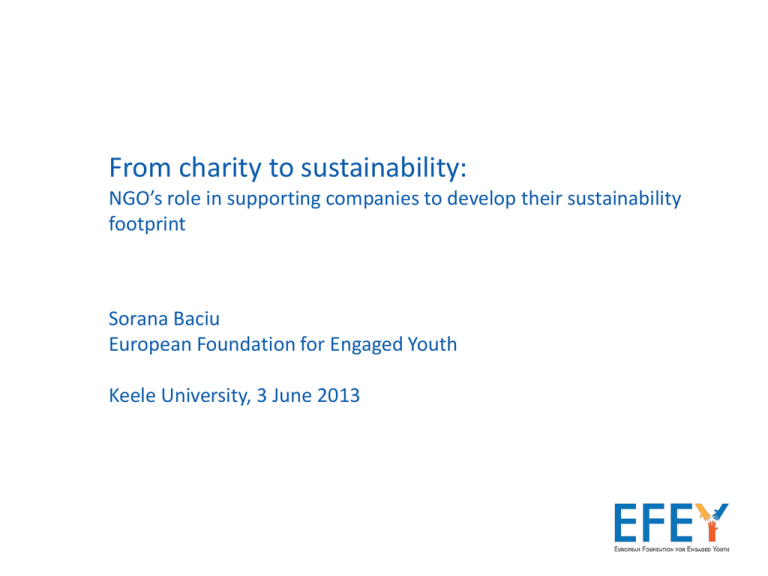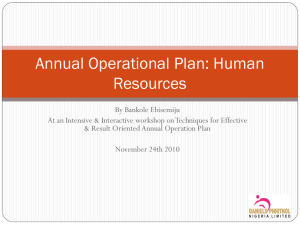PowerPoint Presentation - Sorana Baciu
advertisement

From charity to sustainability: NGO’s role in supporting companies to develop their sustainability footprint Sorana Baciu European Foundation for Engaged Youth Keele University, 3 June 2013 European Foundation for Engaged Youth Corporate Sustainability NGOs – Companies Partnership EFEY at a Glance Vision: An engaged youth contributing to a democratic and prosperous society Mission: Support youth to develop into self-confident and responsible citizens by inspiring them to embrace the key values of a healthy society - family, respect, dignity, honesty, trust, tolerance - and to engage in the democracy building process. Project areas: • • • • • Education and skills Community involvement Human rights Arts and culture Environment From Corporate Profitability To Corporate Sustainability To To To To From Focusing on profit The company exists solely for the profit Philanthropy Massive donations directed to charitable organizations on request Community relations Strategic donations linked to the business’ interest Sustainable business Investments in Integration in the community business’ Strategic partnerships initiated by the company or by other stakeholders activities, purposes, strategy, vision, culture... Source: United Nations for Industrial Development (UNIDO) Why Corporate Sustainability • License to operate • Environmental regulations • Community rules & regulations • Attract investors • Corporate governance standards • Attract and retain talented employees • Increase customers’ loyalty Corporate Sustainability is a business approach that creates long-term shareholder value by embracing opportunities and managing risks deriving from economic, environmental, and social developments.” – Dow Jones Sustainability Index Corporate Sustainability: The Investment Case • Dedicated market indexes for sustainability focused companies (Dow Jones Sustainability Index and the FTSE Good Indexes) • Increased presence of dedicated investment funds sustainability driven companies in Europe and worldwide on • John Prestbo, president of Dow Jones Indexes: Companies pursuing growth in the triple bottom line tend to display superior market performance with favourable risk-return profiles... Thus sustainability becomes a proxy for enlightened and disciplined management – which is just happens to be the most important factor that investors do and should consider in deciding where to buy a stock. • A study of 19 companies*) with a strong social responsibility footprint revealed that over 10 years ending 30 June 2006 they returned 1,026 percent for investors compared to 122 percent for the S&P 500 more, than a 8-to-1 ratio!**) *) Amazon, BMW, CarMax, Caterpillar, Commerce Bank, Costco, eBay, Google, Harley-Davidson, Honda, JetBlue, Johnson & Johnson, Southwest, Starbucks, Timberland, Toyota, UPS, Whole Foods **) Raj Sisodia, David B. Wolfe, Jag Sheth – Firms of Endearment, 2007, Wharton School Publishing NGOs – Companies Evolving Relationship Stakeholders focus NGO NGO A c t i v i s m Shareholders focus Partnership COMPANY COMPANY 1990s 2000 -2010s NGOs – Companies Partnership Companies NGOs • Financial resources • Need to concentrate on core business • Face various environmental, social concerns • Limited skills and competencies • Credibility and integrity • Closer to the communities needs • Expertise in addressing social and environmental issues • Lack financial resources NGOs – Companies Partnership Measuring the Impact • Community benefits best developed and monitored in collaboration with NGO partner • Business and community benefits need to be measured (input, output and impact): • Effects on the community (input, output and impact) • Business effects on employees, customers and other stakeholders • Community involvement should be measured with the same standards as other area of business (integrated in Balance Score Card) • Internal and external evaluation process • Internal: performance indicators and perception measures (e.g. employee survey) • External benchmarking, social screening services, and NGO assessment NGOs – Companies Partnership A Virtuous Circle Develop / refine sustainability strategy Evaluate projects implementation and impact Develop & implement projects Identify partner NGOs Define jointly targets & KPIs NGOs – Companies Partnership Risks and constraints • Not all companies have fully embraced a sustainability approach • Environmental and social regulations have tightened • Companies need to observe all the regulations which give them the license to operate, while lowering the costs • NGOs need to preserve their integrity and credibility, as their main asset NGOs – Companies Partnership The Role of Academic Research • Academic research plays a critical role in analyzing the partnership between companies and NGOs in community involvement • Critical success factors for high impact • Relevant performance indicators for both companies and NGOs • Best practice inventory and transfer Thank you!









